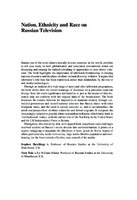Nation, Ethnicity and Race on Russian Television
Proposal review
Mediating post-Soviet difference
| dc.contributor.author | Hutching, Stephen | |
| dc.contributor.author | Tolz, Vera | |
| dc.date.accessioned | 2019-10-17 14:31:45 | |
| dc.date.accessioned | 2020-04-01T10:53:31Z | |
| dc.date.available | 2020-04-01T10:53:31Z | |
| dc.date.issued | 2015 | |
| dc.identifier | 1004208 | |
| dc.identifier | OCN: 1100529852 | en_US |
| dc.identifier.uri | http://library.oapen.org/handle/20.500.12657/25875 | |
| dc.description.abstract | Russia, one of the most ethno-culturally diverse countries in the world, provides a rich case study on how globalization and associated international trends are disrupting and causing the radical rethinking of approaches to inter-ethnic cohesion. The book highlights the importance of television broadcasting in shaping national discourse and the place of ethno-cultural diversity within it. It argues that television’s role here has been reinforced, rather than diminished, by the rise of new media technologies. Through an analysis of a wide range of news and other television programmes, the book shows how the covert meanings of discourse on a particular issue can diverge from the overt significance attributed to it, just as the impact of that discourse may not conform with the original aims of the broadcasters. The book discusses the tension between the imperative to maintain security through centralized government and overall national cohesion that Russia shares with other European states, and the need to remain sensitive to, and to accommodate, the needs and perspectives of ethnic minorities and labour migrants. It compares the increasingly isolationist popular ethno-nationalism in Russia, which harks back to ‘old-fashioned’ values, with the similar rise of the Tea Party in the United States and the UK Independence Party in Britain. Throughout, this extremely rich, well-argued book complicates and challenges received wisdom on Russia’s recent descent into authoritarianism. It points to a regime struggling to negotiate the dilemmas it faces, given its Soviet legacy of ethnic particularism, weak civil society, large native Muslim population and overbearing, yet far from entirely effective, state control of the media. | |
| dc.language | English | |
| dc.relation.ispartofseries | BASEES/Routledge Series on Russian and East European Studies | |
| dc.subject.classification | thema EDItEUR::A The Arts::AT Performing arts::ATF Films, cinema | en_US |
| dc.subject.classification | thema EDItEUR::A The Arts::AT Performing arts::ATJ Television | en_US |
| dc.subject.classification | thema EDItEUR::K Economics, Finance, Business and Management::KN Industry and industrial studies::KNT Media, entertainment, information and communication industries | en_US |
| dc.subject.other | Television | |
| dc.subject.other | television broadcasting | |
| dc.subject.other | national discourse | |
| dc.subject.other | ethnicity | |
| dc.subject.other | ethno-cultural diversity | |
| dc.subject.other | role television | |
| dc.subject.other | Russia | |
| dc.subject.other | new media technology | |
| dc.title | Nation, Ethnicity and Race on Russian Television | |
| dc.title.alternative | Mediating post-Soviet difference | |
| dc.type | book | |
| oapen.identifier.doi | 10.1080/09668136.2016.1152053 | |
| oapen.relation.isPublishedBy | 7b3c7b10-5b1e-40b3-860e-c6dd5197f0bb | |
| oapen.relation.isbn | 9781315722863 | |
| oapen.imprint | Routledge | |
| oapen.series.number | 100 | |
| oapen.pages | 300 | |
| oapen.identifier.ocn | 1100529852 | |
| peerreview.anonymity | Single-anonymised | |
| peerreview.id | bc80075c-96cc-4740-a9f3-a234bc2598f1 | |
| peerreview.open.review | No | |
| peerreview.publish.responsibility | Publisher | |
| peerreview.review.stage | Pre-publication | |
| peerreview.review.type | Proposal | |
| peerreview.reviewer.type | Internal editor | |
| peerreview.reviewer.type | External peer reviewer | |
| peerreview.title | Proposal review | |
| oapen.review.comments | Taylor & Francis open access titles are reviewed as a minimum at proposal stage by at least two external peer reviewers and an internal editor (additional reviews may be sought and additional content reviewed as required). | |
| oapen.review.comments | Taylor & Francis open access titles are reviewed as a minimum at proposal stage by at least two external peer reviewers and an internal editor (additional reviews may be sought and additional content reviewed as required). |

